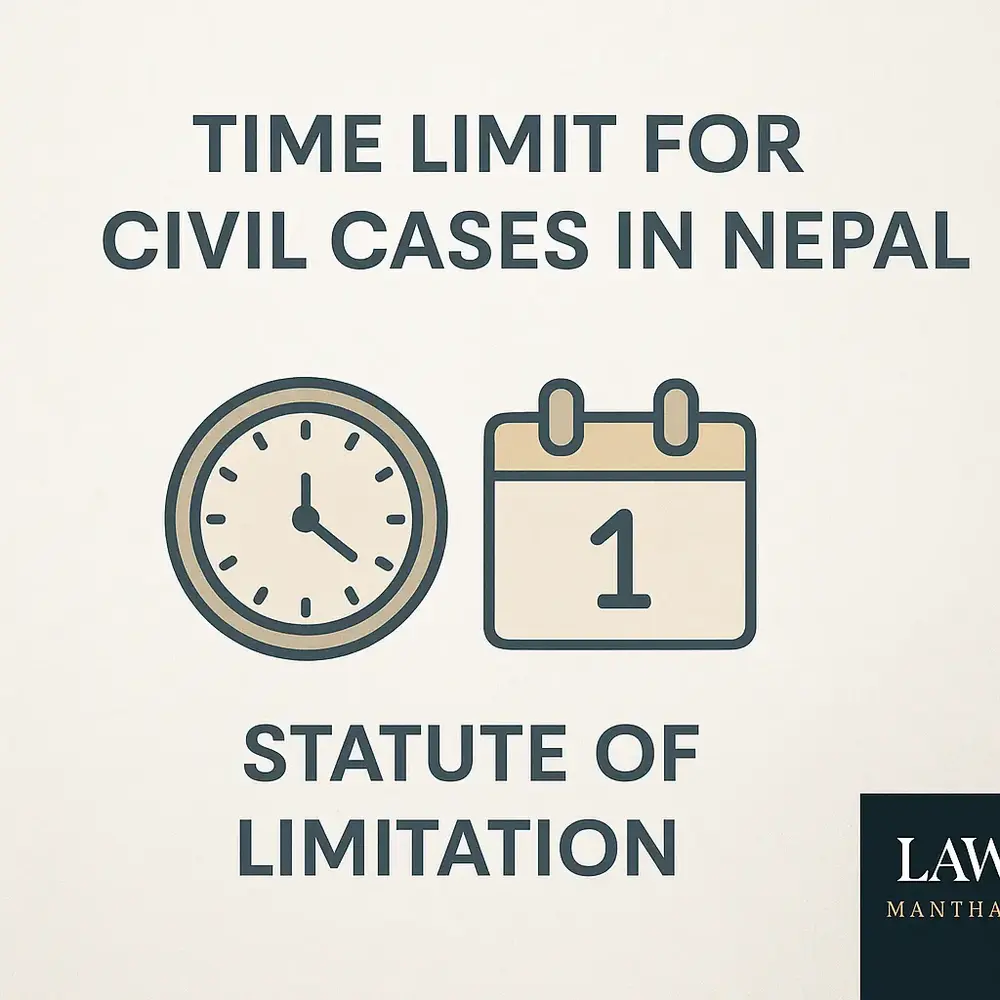In Nepal, the statute of limitation is the maximum period of time within which a person must file a civil case in court. If someone tries to file a case after this legal time limit, the court will not accept it—even if the case is genuine. This rule helps maintain fairness and ensures that legal disputes are resolved within a reasonable period.
Legal Provision in Nepal
The main law that deals with the limitation period for civil cases in Nepal is the National Civil Procedure(Code) Act, 2074 B.S. It clearly mentions the time frames for filing different kinds of civil lawsuits.
Why Is the Statute of Limitation Important?
The time limit is not just a formality. It protects both parties in a dispute. It ensures that:
- People don’t keep living under fear of being sued after many years.
- Evidence and memories are still fresh.
- Cases are filed and resolved quickly, promoting justice.
If there were no deadlines, people could bring up very old cases, and it would be difficult to find documents, witnesses, or even remember details. So, limitation laws encourage timely action.
Limitation in Different Cases
1. Partition of Property
If partition has never been done formally, or even if there is no written agreement but both parties have used and shared the property by making calculations, the person can file a case at any time. There is no time limit in such cases.
If the partition was recently completed but one party is not satisfied with how it was done, they must file the case within three months from the date of partition.
If someone has hidden or concealed property during the partition, the affected person can file a lawsuit during the lifetime of the person who concealed it.
For any other cases not covered in the above points, the lawsuit must be filed within six months from the date the act was done or the action was taken.
2. Breach of Contract
For general contract disputes, the limitation period is 2 years from the date the contract was broken or violated.
3. Chapter relating to Marriage
If any person feels harmed by an act or action taken under this Chapter, they must file a lawsuit within three months from the date the act was done or the action was taken. If they do not file the case within this time, the court may reject it as time-barred. Therefore, it is important to act promptly to protect one’s legal rights.
4. Chapter Relating to Divorce
If someone is harmed by any act or action taken under this Chapter, they must file a lawsuit within three months from the date the cause of action arises or from the day they come to know about it. If they miss this deadline, the court may not accept the case. So, it’s important to act quickly once the issue is known.
5. Chapter relating to the relation of Children and Parents
A person aggrieved from any act done or
action taken under this Chapter may make a lawsuit within the
specific statute of limitation, if any, provided in this Chapter for
making such lawsuit, and within six months after the date on which
such an act was done or action taken, in the other circumstances.
6. Chapter relating to Adopted Son and Daughter
If a person feels harmed by any act or action taken under this Chapter, they must file a lawsuit within one year from the date the act was done or the action took place. If they miss this time limit, the court will not accept their case.
7. Chapter relating to Inheritance
A lawsuit may be made within the statute of
limitation, if any, set forth elsewhere in this Chapter, and in the
other cases, within a period of three years after the date on which
the succession is opened.
8. Property Disputes
If someone occupies another person’s land or house illegally, the legal owner must file a case within 6 months from the date of encroachment.
Exceptions and Special Considerations
Some situations may extend or delay the limitation period. In Nepal, the time limit can be paused or extended under certain conditions:
- Minor or mentally ill person: If the affected person is a child or mentally unfit, the limitation period starts only after they reach adulthood or regain mental capacity.
- Fraud or concealment: If someone hides the facts or deceives the other party, the limitation starts only when the truth is discovered.
- Force Majeure or lockdowns: During natural disasters, pandemics, or situations like the COVID-19 lockdown, the limitation period may be paused for a certain period.
Consequences of Missing the Deadline
If someone tries to file a civil case after the time limit is over, the court will reject the petition. Even if the case is legally and morally right, the court cannot entertain it. This is known as “time-barred case”.
For instance, if a person was cheated in a contract but waited for 5 years to take action, the court will not accept the case because the 3-year limit has expired.
Practical Importance for People
Many people in Nepal, especially in rural areas, are unaware of the limitation period. They often delay legal action because of family pressure, social fear, or financial issues. But waiting too long can take away their right to justice forever.
That’s why legal awareness is crucial. Knowing the limitation period helps people to act on time and avoid losing their rights.
Limitation in Relation to Court Efficiency
From the court’s perspective, limitation laws help reduce unnecessary backlog of old cases. They filter out outdated and weak claims. This improves the efficiency of courts and allows them to focus on fresh and serious cases.
Conclusion
The statute of limitation in civil cases is a powerful tool that protects both the plaintiff and the defendant. It gives people a clear window to seek justice. It also helps the courts manage cases effectively and fairly. Missing this time limit means losing the chance to get justice through court. So, it is important for every Nepali citizen to know their rights and the time limits attached to them. Early action, timely legal consultation, and awareness of deadlines can make all the difference between winning and losing a case.




